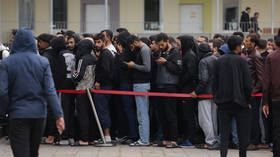Cyprus: Thousands of Turkish Muslims protest against Islamization and repeal of hijab ban in schools
These Turkish Cypriots could, once again, give up their pretense of a “Turkish Republic of Northern Cyprus,” and reunite with the Greek Christians on the island.
In any case, it’s noteworthy that opposing Islamization in the West makes one racist and bigoted, but no one seems to think to call these Turkish Cypriots that.
Panic in Cyprus as protests over headscarves and Islam reach boiling point
by John Varga, Express, May 4, 2025:
Thousands of Turkish Cypriots took to the streets in the northern half of Nicosia on Friday to protest against attempts by the government to make the country more Islamic. The protest was the latest in a series of demonstrations organised by trade unions, who have expressed concerns about the erosion of secularism by the right wing government.
In particular, protest organisers are worried about the introduction of Islam into the education system. Demonstrators held up placards saying “It won’t pass” and “Cyprus will stay secular”.
The protests began in April after Turkish-Cypriot authorities scrapped a ban on the wearing of headscarves in high schools.The move was swiftly condemned as an encroachment into the strictly secular education system aimed at the eventual “Islamisation” of Turkish Cypriot society.
Elma Eylem, president of the Teachers’ Union KTOEÖS, said the rule change was a blatant attempt at “social engineering” and at asserting the dominance of political Islam over the country by Turkey.
“This issue is not a matter of freedom, headscarf or regulation,” she told Euronews.
“This issue is a step taken by the AKP (Turkey’s ruling party) in its efforts to deepen the political Islam domination over the Turkish Cypriot Community.”…
Germany cracks down on illegal immigration

Germany’s new government has ordered tighter border controls, marking a sharp shift in immigration policy and fulfilling a key campaign promise of Chancellor Friedrich Merz.
The leader of the Christian Democratic Union (CDU) party, Merz was elected chancellor on the second attempt on Tuesday after failing his first confirmation vote in parliament earlier in the day. He had pledged to turn back illegal migrants at the border on his first day in office.
On Wednesday, newly appointed Interior Minister Alexander Dobrindt signed an order banning asylum applications at all land borders. In a letter seen by Bild, he instructed the head of the Federal Police, Dieter Romann, to disregard a directive from 2015.
“I hereby withdraw the verbal instruction given… on 13 September 2015,” he wrote.
The instruction came from then Chancellor Angela Merkel, who opened Germany’s borders to more than a million migrants at the height of Europe’s 2015–16 refugee crisis. Her open-door policy later drew fierce political backlash and was labeled “disastrous” by critics.
Dobrindt said Germany would not close its borders but would significantly tighten control. Police have been instructed to turn people away directly at the border, he told a press conference, noting exceptions for children, pregnant women, and other “vulnerable” groups.
The minister added that around 2,000 to 3,000 officers would be added to the current 11,000-strong federal police force stationed at the borders. He emphasized that the new approach should not “place excessive demands” on neighboring states and confirmed consultations were already underway with those countries.
Germany has a 3,700km-long land border with nine countries, including Poland, Austria, France, and the Netherlands. All are part of the EU’s Schengen Zone, which allows passport-free travel for most EU citizens and many non-EU nationals.
Migration remains one of Germany’s most divisive political issues, with local authorities often warning that the number of asylum seekers is straining their budgets. The right-wing Alternative for Germany (AfD) party, known for its strong anti-immigration stance, was designated a “confirmed extremist entity” last week by the domestic intelligence agency BfV, which said its activities could threaten Germany’s democratic order. The party filed a legal challenge on Monday.
As the EU’s largest economy, Germany remains the top destination for asylum seekers. The country received a quarter (over 237,000) of all asylum applications across the bloc in 2024, though the number was significantly lower in annual terms.





No comments:
Post a Comment